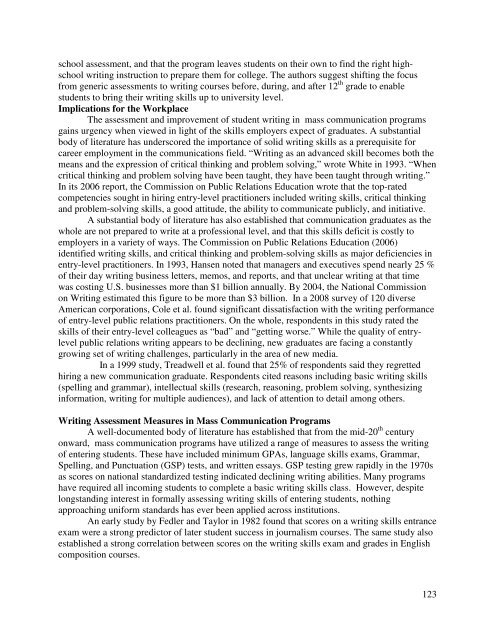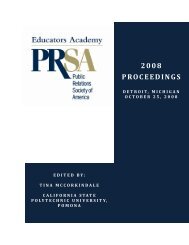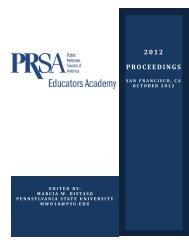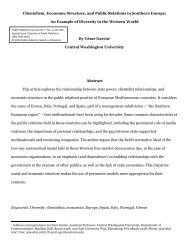2010 - Public Relations Society of America
2010 - Public Relations Society of America
2010 - Public Relations Society of America
Create successful ePaper yourself
Turn your PDF publications into a flip-book with our unique Google optimized e-Paper software.
school assessment, and that the program leaves students on their own to find the right highschool<br />
writing instruction to prepare them for college. The authors suggest shifting the focus<br />
from generic assessments to writing courses before, during, and after 12 th grade to enable<br />
students to bring their writing skills up to university level.<br />
Implications for the Workplace<br />
The assessment and improvement <strong>of</strong> student writing in mass communication programs<br />
gains urgency when viewed in light <strong>of</strong> the skills employers expect <strong>of</strong> graduates. A substantial<br />
body <strong>of</strong> literature has underscored the importance <strong>of</strong> solid writing skills as a prerequisite for<br />
career employment in the communications field. “Writing as an advanced skill becomes both the<br />
means and the expression <strong>of</strong> critical thinking and problem solving,” wrote White in 1993. “When<br />
critical thinking and problem solving have been taught, they have been taught through writing.”<br />
In its 2006 report, the Commission on <strong>Public</strong> <strong>Relations</strong> Education wrote that the top-rated<br />
competencies sought in hiring entry-level practitioners included writing skills, critical thinking<br />
and problem-solving skills, a good attitude, the ability to communicate publicly, and initiative.<br />
A substantial body <strong>of</strong> literature has also established that communication graduates as the<br />
whole are not prepared to write at a pr<strong>of</strong>essional level, and that this skills deficit is costly to<br />
employers in a variety <strong>of</strong> ways. The Commission on <strong>Public</strong> <strong>Relations</strong> Education (2006)<br />
identified writing skills, and critical thinking and problem-solving skills as major deficiencies in<br />
entry-level practitioners. In 1993, Hansen noted that managers and executives spend nearly 25 %<br />
<strong>of</strong> their day writing business letters, memos, and reports, and that unclear writing at that time<br />
was costing U.S. businesses more than $1 billion annually. By 2004, the National Commission<br />
on Writing estimated this figure to be more than $3 billion. In a 2008 survey <strong>of</strong> 120 diverse<br />
<strong>America</strong>n corporations, Cole et al. found significant dissatisfaction with the writing performance<br />
<strong>of</strong> entry-level public relations practitioners. On the whole, respondents in this study rated the<br />
skills <strong>of</strong> their entry-level colleagues as “bad” and “getting worse.” While the quality <strong>of</strong> entrylevel<br />
public relations writing appears to be declining, new graduates are facing a constantly<br />
growing set <strong>of</strong> writing challenges, particularly in the area <strong>of</strong> new media.<br />
In a 1999 study, Treadwell et al. found that 25% <strong>of</strong> respondents said they regretted<br />
hiring a new communication graduate. Respondents cited reasons including basic writing skills<br />
(spelling and grammar), intellectual skills (research, reasoning, problem solving, synthesizing<br />
information, writing for multiple audiences), and lack <strong>of</strong> attention to detail among others.<br />
Writing Assessment Measures in Mass Communication Programs<br />
A well-documented body <strong>of</strong> literature has established that from the mid-20 th century<br />
onward, mass communication programs have utilized a range <strong>of</strong> measures to assess the writing<br />
<strong>of</strong> entering students. These have included minimum GPAs, language skills exams, Grammar,<br />
Spelling, and Punctuation (GSP) tests, and written essays. GSP testing grew rapidly in the 1970s<br />
as scores on national standardized testing indicated declining writing abilities. Many programs<br />
have required all incoming students to complete a basic writing skills class. However, despite<br />
longstanding interest in formally assessing writing skills <strong>of</strong> entering students, nothing<br />
approaching uniform standards has ever been applied across institutions.<br />
An early study by Fedler and Taylor in 1982 found that scores on a writing skills entrance<br />
exam were a strong predictor <strong>of</strong> later student success in journalism courses. The same study also<br />
established a strong correlation between scores on the writing skills exam and grades in English<br />
composition courses.<br />
123
















